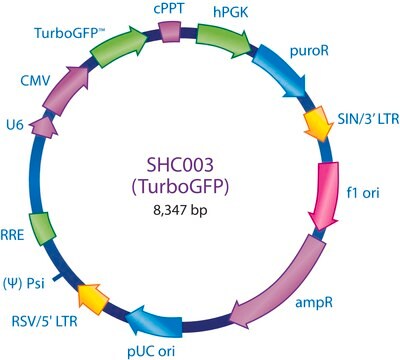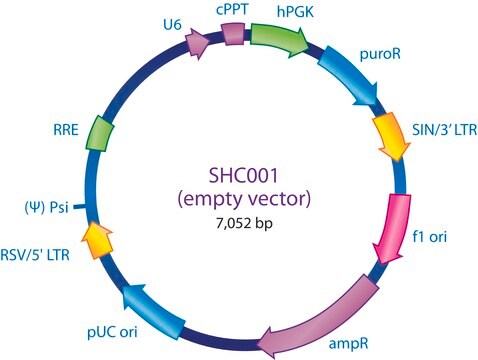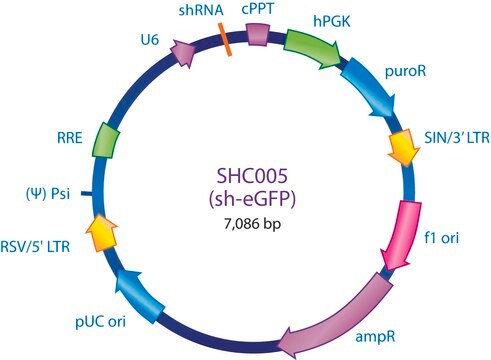推荐产品
產品線
MISSION®
儲存溫度
−70°C
基因資訊
正在寻找类似产品? 访问 产品对比指南
一般說明
The clones are sequenced-verified shRNA lentiviral plasmids (pLKO.1-puro) provided as 50 μl bacterial glycerol stocks (Terrific Broth, carbenicillin at 100 μg/ml and 15% glycerol). The set comes in 96-well plates that are barcoded for simple identification. A CD containing RefSeq, gene description, gene symbol, clone ID, hairpin sequence, locus link, and plate map positions are provided with the gene family set.
其他說明
Each MISSION shRNA clone is constructed within the lentivirus plasmid vector, pLKO.1-Puro, followed by transformation into Escherichia coli. The pLKO.1-Puro vector contains bacterial (ampicillin) and mammalian (puromycin) antibiotic resistance genes for selection of inserts in either bacterial or mammalian cell lines. Each clone set consists of an average of 3-5 constructs that have been designed against each target gene using a proprietary algorithm. Therefore, a range of knockdown efficiency, with at least one construct from each gene set being >70%, can be expected when using these clones. This allows one to examine the effect of loss of gene function over a large series of gene knockdown efficiencies. Each shRNA construct has been cloned and sequence verified to ensure a match to the target gene.
For a detailed listing of other available gene family sets, visit the gene family set website.
Number of Genes: 124, Number of Clones: 818
The exact gene and clone count at time of purchase may vary slightly as the TRC library is continually updated.
法律資訊
Use of this product is subject to one or more license agreements. For details, please see http://sigmaaldrich.com/missionlicense .
MISSION is a registered trademark of Merck KGaA, Darmstadt, Germany
儲存類別代碼
10 - Combustible liquids
水污染物質分類(WGK)
WGK 2
閃點(°F)
Not applicable
閃點(°C)
Not applicable
Benjamin Nicholson et al.
Future oncology (London, England), 3(2), 191-199 (2007-03-27)
Tagging proteins with mono- or poly-ubiquitin is now recognized as a multifaceted and universal means of regulating cell growth and physiology. It does so by controlling the cellular lifetime of nearly all eukaryotic proteins and the cellular localization of many
Susan M Millard et al.
The Journal of cell biology, 173(4), 463-468 (2006-05-17)
Ubiquitylation is a key regulator of protein trafficking, and much about the functions of ubiquitin ligases, which add ubiquitin to substrates in this regulation, has recently come to light. However, a clear understanding of ubiquitin-dependent protein localization cannot be achieved
我们的科学家团队拥有各种研究领域经验,包括生命科学、材料科学、化学合成、色谱、分析及许多其他领域.
联系技术服务部门








